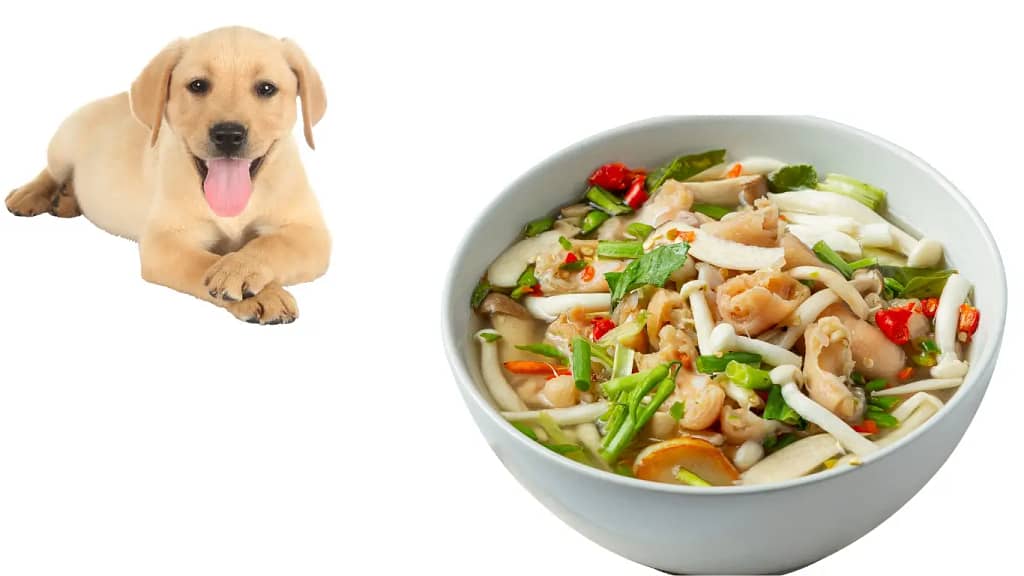Imagine you’re amidst a compelling culinary adventure, savoring the fiery flavors of a spicy dish, when suddenly, your beloved canine companion sneaks a bite. Panic sets in as you consider the potential consequences of your dog’s culinary curiosity.
Welcome to the canine spice conundrum, where pet owners walk a tightrope between sharing scrumptious human food and keeping their furry friends safe. Let’s explore the real-world problem of spicy food encounters for dogs and unveil the best course of action to protect your precious pup from the heat.

Table of Contents
Toggle1. Why Is Spicy Food Bad For Dogs?
When dogs eat spicy food, they experience a painful burning sensation in their mouth and digestive system. Hot peppers contain a natural ingredient called capsaicin, which is the compound that creates the spicy flavor. The capsaicin in spicy foods can lead to an upset stomach or cause more severe issues for your dog’s digestive system.
As with spicy food, you should avoid feeding your dog people food or dog food above their average body temperature—about one hundred degrees Fahrenheit. Serve store-bought and homemade dog food at room temperature to ensure it is safe for dogs.
Health Risks If Your Dog Eats Spicy Foods:
- Excessive thirst and bloating:
- Stomach issues:
- Vomiting and diarrhea
Excessive thirst and bloating: Large amounts of spicy foods can cause your puppy to feel thirsty from the burning sensation caused by capsaicin. They may drink too much water, resulting in bloating and stomach pain.
Stomach issues: Excessive amounts of spicy foods like chili peppers can cause stomach ulcers in your dog’s gastrointestinal tract or other stomach problems like anemia or canine pancreatitis, in which the pancreas becomes inflamed.
Vomiting and diarrhea: Dogs can react strongly to capsaicin and experience adverse effects like vomiting, diarrhea, or other issues with their digestive tract.
2. Dogs Don’t Like Chilies:
Many of the elements in spicily prepared food may harm your pet. Of course, the Chili itself is the main component. Chili peppers are fruits that develop on plants in the Capsicum genus and are used to make spicy food. Capsaicin is what causes the familiar burning sensation you experience after eating food that is sour or sour-like.
Dogs cannot be poisoned by capsaicin, but ingesting it will give them a burning feeling in their mouth and throat that is quite uncomfortable. It can be extremely distressing for your pet in addition to being unpleasant. Since it includes capsaicin from dried chilies, chili powder, typically used in spicy meals, might make your dog feel as uncomfortable as the chili paper.
3. When A Dog Eats Spicy Food, What Happens?
Like people, dogs might have varying levels of tolerance for spicy food. Some people can be more susceptible to it and show symptoms more quickly.
While eating spicy food sometimes may not harm your dog’s health permanently, it can raise the danger of gastrointestinal problems and other difficulties. Dogs should never be given certain spicy foods since they can be poisonous.
You’ll know everything your dog gets his paws on immediately if it’s hot! Like humans, the mouth will burn shortly after consuming chili peppers, chili powder, or other hot foods. Symptoms brought on by capsaicin can vary, but most dogs will begin to sneeze, drool, or foam at the mouth when exposed to it.
- Watery, runny eyes
- Pawing at the face
- Rubbing the face on furniture or carpet
- Panting
- Thirst
- Vomiting
- Diarrhea
- Flatulence (gas)
4. If My Dog Ate Chili Pepper, Should I Take Him To The Vet?
You can try treatment at home if your dog still appears healthy and happy and doesn’t take any poisons. If you are concerned about your dog, calling your veterinarian for guidance or requesting an appointment is always appropriate.
Feed your dog food that is simple to digest. You might also ask the vet for some probiotic paste. Your dog could require an anti-sickness shot to help them calm down if they become drowsy or vomit repeatedly.
5. What To Do When Your Dog Consumes Spicy Food?
For an added cooling impact, you may even add some ice cubes! Once their stomach has calmed, try giving them a scoop of plain yogurt to calm their stomach and ease any intestinal distress. But make sure it’s bare- no added oils, fats, or spices.
It’s also important to remember that your pup’s diet should be bland for a little while. Stick to boiled chicken and rice- it’s easy on their stomach and helps to regulate their digestion. Avoid any decadent doggy treats while their tummy is upset.
They can prescribe medication to soothe their stomach and help them feel more comfortable. If their symptoms persist or get worse, it’s time to contact a veterinarian for further advice.
Some additional tips to help your pup get through this spicy situation:
Give your dog a peaceful, cozy spot to rest and recover. They could feel more secure if they had a familiar pillow or blanket.
Observe their actions and attitude. You should call the vet if your dog appears in discomfort or lethargy.
Offer no human medications unless a veterinarian instructs you to because some medications can poison dogs.
Think about purchasing pet insurance. Unexpected visits to the veterinarian can be costly, but pet insurance can help defray the cost of care.
6. Can Dogs Eat Spicy Food:
The most common answer is no; dogs cannot consume Chili or other hot food. Chilli contains capsaicin. It is equally unpleasant for both you and your dog.
To drink because it irritates the tongue and throat and makes them feel burned. Dogs who eat spicy food may also experience stomach distress and excessive thirst. These immediate effects, albeit not life-threatening, might cause your pet distress.
Other elements in spicy cuisines, such as onions and garlic, may be unsafe for your dog. It is advisable to refrain from giving your dog any spicy food, but if they do manage to get their paws on some, you should seek advice from your veterinarian.
Dogs who eat spicy food risk digestive problems if they do so enough of it. It can even be toxic. Give your dog lots of water, and watch for signs of distress if they’ve eaten something spicy. Make an urgent phone call to your veterinarian if the symptoms continue. If you take the necessary precautions, you can assist your dog in recovering from a spicy accident.
Conclusion
In conclusion, if your dog accidentally consumes spicy food, it is essential to remain calm and take immediate action to minimize potential adverse effects. Monitor your dog closely for signs of discomfort or distress, such as vomiting, diarrhea, excessive drooling, or restlessness. Provide fresh water to help dilute the spiciness and soothe their digestive system. I hope you will understand giving the above information.
FAQs
Does Chili Harm Dogs?
Chilli peppers don’t poison dogs. However, they do contain a chemical called capsaicin that irritates canines. Your dog may have stomach problems if he consumes too many chili peppers.
Can Canines Feel The Heat Of Chili?
Dogs can therefore be impacted by the heat from spicy foods even if they cannot detect spice. Dogs are far more sensitive to the heat in peppers and other foods, so even something you don’t think is spicy could cause your loving dog great discomfort.
Are Spices Safe For Canines?
Yes, some spices and herbs are beneficial to dogs. You can supplement your dog’s diet with non-toxic herbs like chamomile, ginger, oregano, and more. Garlic, onion powder, and cocoa powder are a few herbs and spices that can poison dogs, so it’s crucial to be aware of this.
Why do some dogs like spicy food?
Peppers get their heat from a chemical called capsaicin, the substance encasing the chili seeds. While dogs can’t taste the flavor of the Chili, the capsaicin triggers a response in a pup’s mouth, throat, and central nervous system.
What Spices Irritate Dogs?
Unsafe Spices for Dogs Chili powder: This spice blend contains toxic ingredients like garlic powder and ground chili. Black pepper, cayenne, or ground chili pepper can harm your dog’s health.

